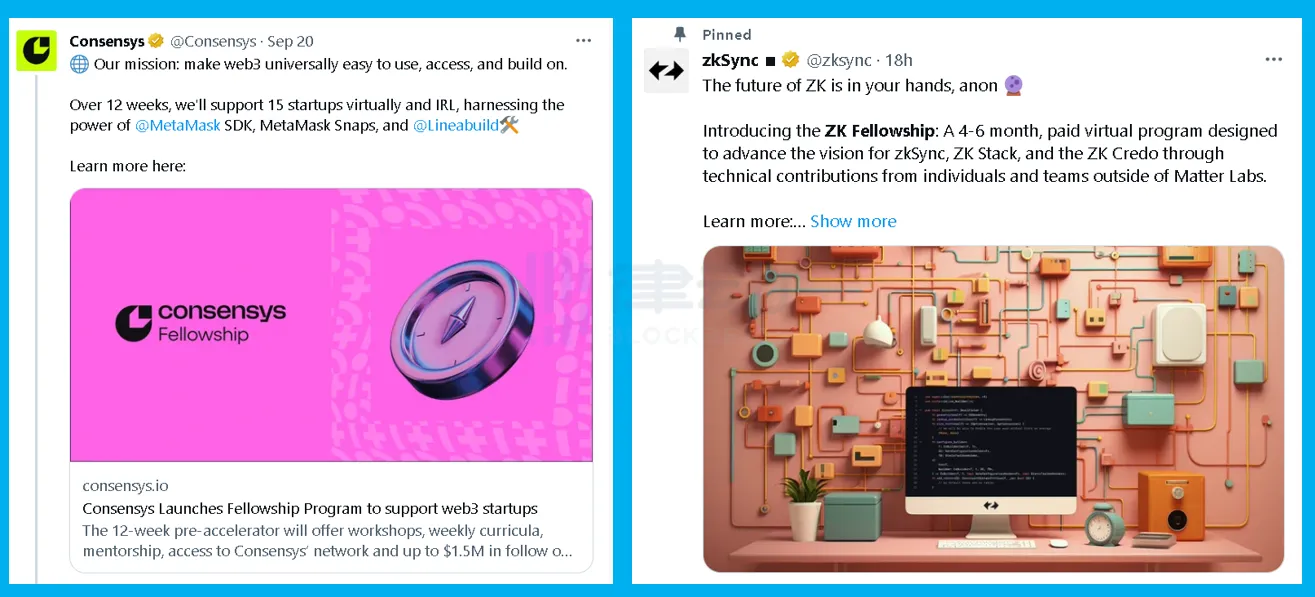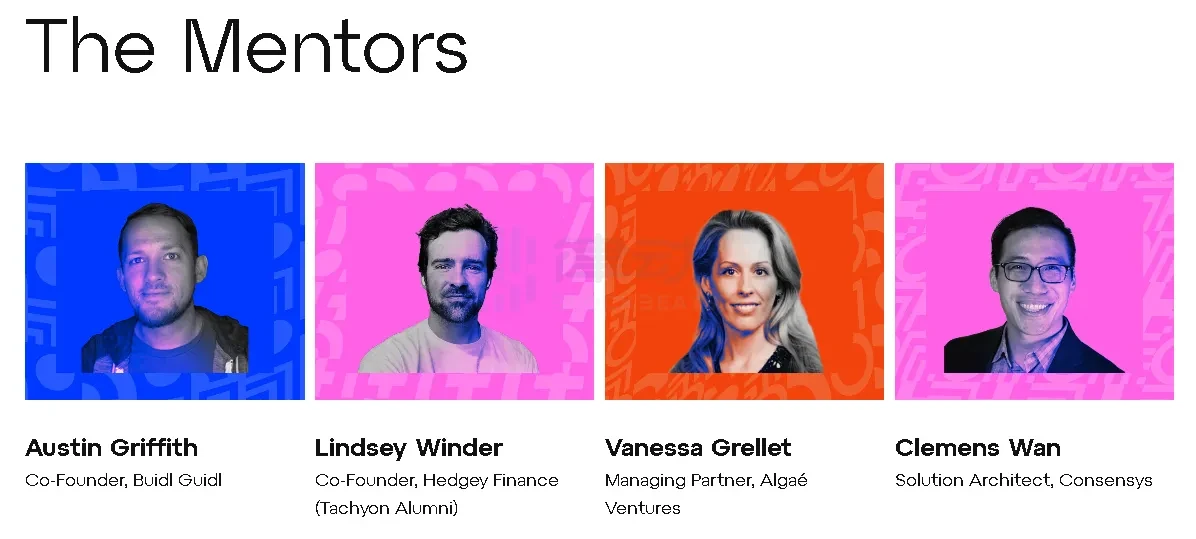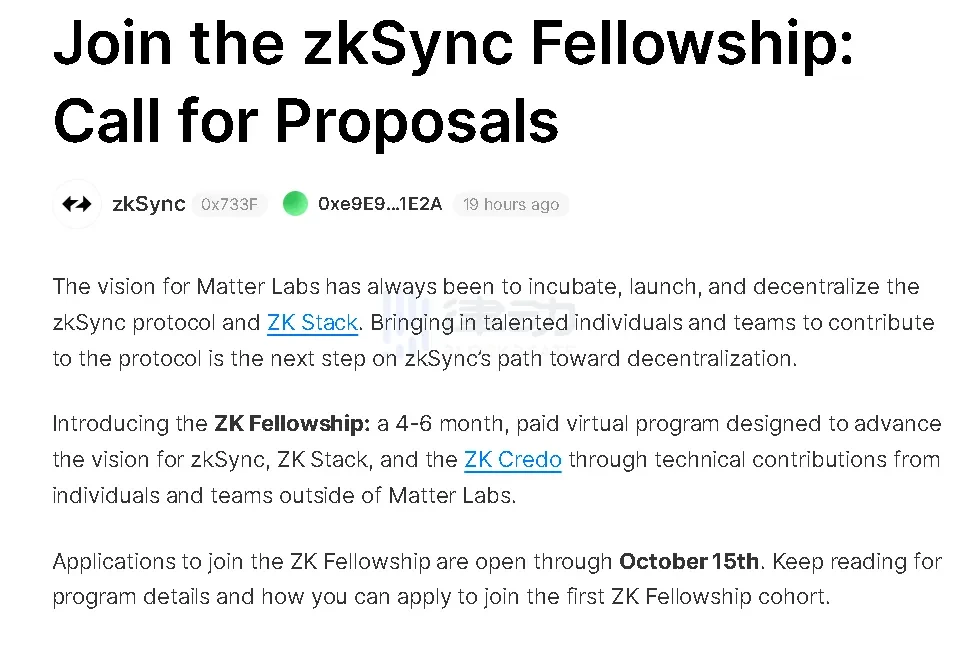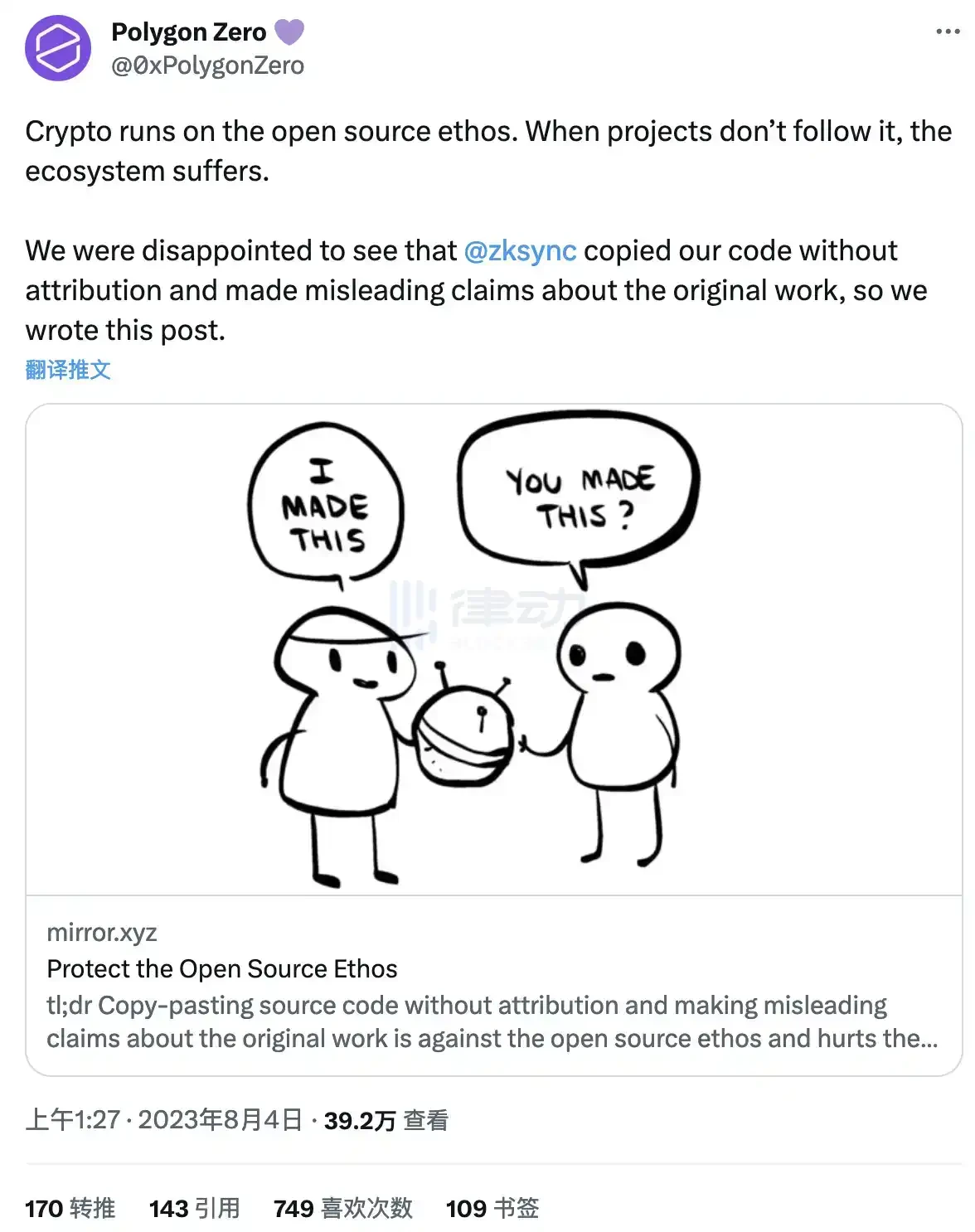Original author: Jaleel, Luccy, BlockBeats
Original editor: Jack, BlockBeats
The day before yesterday, Consensys announced the launch of a Web3 Fellowship program, which will select and support 15 startups within 12 weeks, aiming to find the best Web3 builders to unleash the collaborative power of the community. Worth pondering is that the next day, zkSync also announced the launch of a 4-6 month Fellowship program, hoping to advance the development of zkSync, ZK Stack, and ZK Credo through the technical contributions of individuals and teams.
In addition to the Fellowship program, major L2 projects seem to be enthusiastic about project legitimacy, code originality, and RaaS. The competition in the L2 track seems to be turning into a fierce "melee."
Fellowship
In this wave of Fellowship programs, there are significant differences between Consensys and zkSync in terms of preparation and funding.

On Consensys' Fellowship program website, it can be seen that the program is a pre-accelerator program designed to support web3 startups and founders using the Consensys software suite. This is also a non-equity program, providing the opportunity to receive potential investments of up to $1.5 million. Through this fellowship, Consensys aims to help participating teams develop new use cases, benefiting the larger Ethereum community.
The first batch of Fellowship programs will provide support for 15 startups within 12 weeks, including practical exercises, interactive seminars, and case studies to address the challenges faced by web3 builders. Currently, the project is considering three verticals, namely scalability, optimization, and L2. Scalability refers to Consensys' support for projects that drive scalability within the web3 ecosystem through wallet or application layer functionalities.
In addition, optimization refers to projects that provide valuable tools, middleware, and other solutions to simplify the development process. In the L2 field, projects related to L2 solutions and zero-knowledge proofs are provided to help improve the scalability and performance of the Ethereum and EVM chains.
The Consensys Fellowship program team will select the top 15 startups to join its first batch of startups, with an additional 3 startups on the waiting list. The program will officially start on November 6, 2023, and will hold an immersive real-life demo day on April 5, 2024. In addition, the program will bring in professional mentors, including Austin Griffith, co-founder of Buidl Guidl, Lindsey Winder, co-founder of Hedgey Finance, Vanessa Grellet, Managing Partner of Algaé Ventures, and Clemens Wan, Solution Architect at Consensys.

On the other hand, compared to the well-prepared Consensys, zkSync's Fellowship program appears to be more "rough," with only a theme list and no additional information. Consensys attached a webpage designed for the Fellowship program and application methods in its official announcement, while zkSync only has an article.

Currently, zkSync's Fellowship program has prepared multiple themes for candidates, including ZKP memory model related to recursive/folding in tracking expansion, scalable cross-rollup review resistance, and tracking expansion technology/continuation. In the aggregation technology aspect, it includes how to avoid fragmentation of consensus equity in the multi-aggregation ecosystem, MEV aggregation, privacy support and privacy primitives of aggregation, and aggregation data exploration beyond L2BEAT.
In addition, in the zero-knowledge and verification aspect, it includes zero-knowledge DeFi primitives, including but not limited to transaction matching, risk management, settlement, custody, and proof, as well as zero-knowledge proof aggregation and verification schemes, zero-knowledge proof production, zero-knowledge virtual machine model, validator and sequencer market dynamics, and self-sovereign TX verification assistant, which can correctly parse ABI-encoded data and provide visualization of fields and values.
It also includes cross-L2 gas fee mechanisms, distributed operation and parallelization of ZK provers, fuzz testing of zkSync components, and generalization of web3js/ethers.js/ethers.rs, which separates interaction intent from ABI encoding, tx encoding, signature creation, etc.
If the applicant's proposal is accepted, they will receive a response from Matter Labs before November 1 and will receive a monthly stipend of $3,500 during the Fellowship. Matter Labs stated that this is grant-based funding, not a contractual position, and hopes that the work products of the applicants will be open-source, well-documented, and accessible to others. The most successful participants will have the opportunity to receive long-term scholarships and positions at Matter Labs, or join Matter Labs' incubation program and work closely with Matter Labs' investment team.
Although zkSync has previously received a high amount of funding of $458 million, it still pales in comparison to ConsenSys, the parent company behind Linea. After all, ConsenSys has received $726 million in funding, making its funds abundant. At the same time, ConsenSys' project MetaMask is undoubtedly the leader in the wallet track, bringing considerable profits to ConsenSys and providing strong support for Linea.
Not only Fellowship, but competition in L2 is everywhere
zkSync's rapid launch of the Fellowship program following its competitors inevitably brings to mind the ZK Stack, which was quickly launched by zkSync after OP Stack.
In October 2022, Optimism introduced the OP Stack, which is a "highly scalable, highly interoperable modular open-source blueprint for various types." As a standardized open-source module, developers can assemble a customized chain through OP Stack to serve any specific blockchain use case.
After nearly half a year of development, zkSync immediately announced the launch of the modular open-source framework ZK Stack for building custom zkRollups, giving developers complete autonomy, from choosing data availability patterns to using their own token for decentralized sorting.
Related reading: "Can zkSync's OP Stack competitor win the L2 scaling battle?"
The design of OP Stack allows for easier forking of code than current efforts, as developers can easily abstract various components of the blockchain and modify it by inserting different modules. ZK Stack provides two key functionalities: sovereignty and seamless connectivity. These zkRollup chains operate independently, relying only on Ethereum L1 to achieve their activity and security, while cross-chain bridges facilitate interconnection of each chain, achieving trustless, fast, and cheap interoperability.
With numerous star projects, the intense competition in the L2 track has become a well-known fact throughout the crypto industry. In addition to the OP Stack and ZK Stack launched by Optimism and zkSync, the competition in the RaaS field between the OP Rollup camp and the ZK Rollup camp also includes Arbitrum's Orbit and Starknet's Appchain. In the zkEVM field, the tense relationship between the two "domestic pride" projects, Scroll and Taiko, has also become an open secret in the industry.
Furthermore, in early last month, Polygon's official zero-knowledge proof team, Polygon Zero, publicly criticized zkSync in an article titled "Protecting the Spirit of Open Source," accusing zkSync of unauthorized replication of Polygon's open-source code and making misleading statements, which sparked widespread industry attention for a while.
Polygon Zero stated that a large amount of code from the Plonky2 proof system, developed by Polygon Labs, was used in their recently released Boojum library. While Plonky2 is open-source, Polygon Zero claimed that Matter Labs did not provide proper attribution. Additionally, Polygon Zero accused Matter Labs of making misleading comparisons in describing the performance of Plonky2 and Boojum, with Matter Labs' founder claiming that Boojum is more than 10 times faster than Plonky2.

Matter Labs' founder Alex responded strongly to the accusations, denying Polygon Zero's claims and stating that clear attribution was provided in their GitHub code repository when using Plonky2's code.
Alex also provided relevant links as theoretical support for his response. In response to Alex's statement, storm from Paradigm expressed agreement, stating that zkSync's attribution could be improved, but it is definitely not plagiarism, at most it could be considered a bit careless.
Related reading: "Polygon Zero accuses zkSync of plagiarism, founder responds 'Open source may not be for you'"
Looking at the entire L2 track, zkSync stands out in terms of transaction activity. With the launch of zkSync's zkEVM mainnet ZkSync Era in March 2023, its TVL once rose to $700 million.
One of the main reasons for this may be that zkSync's L2 competition strategy is to never give up and often closely follow its competitors. However, zkSync may also face a major issue, which is whether closely following its competitors means that it still needs to strive for innovation. What new attempts should be made in attracting users and transactions in the ecosystem may be a significant challenge for zkSync.
免责声明:本文章仅代表作者个人观点,不代表本平台的立场和观点。本文章仅供信息分享,不构成对任何人的任何投资建议。用户与作者之间的任何争议,与本平台无关。如网页中刊载的文章或图片涉及侵权,请提供相关的权利证明和身份证明发送邮件到support@aicoin.com,本平台相关工作人员将会进行核查。




